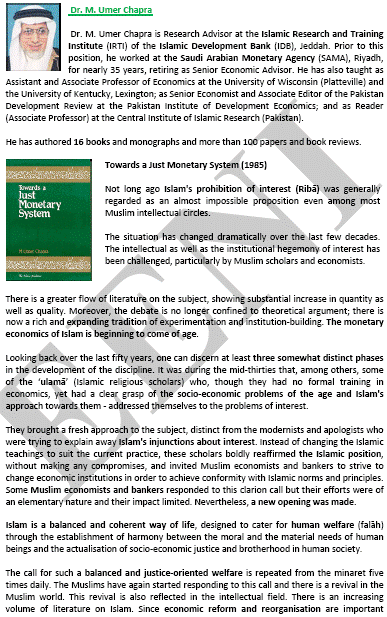Islamic Economics, Sharia, Sunna, Zakat

Principles of Islamic Economics: Quran, Sharia, Sunna, Hadith
- Principles of Islamic Economics
- Importance of the Zakat
- Islamic Banking
- Hawala
- Waqf Fund
- Islamic Economists;
- M. Umer Chapra
- Kurshid Ahmad
- Muhammad Abdul Mannan
- Islamic Consumer Behaviour
- Halal Certificate
- Islamic Chamber of Commerce
- Arab Development Funds

The Subject “Islamic Economics” belongs to the following Online Programs taught by EENI Global Business School:

Masters: International Business, Foreign Trade, Religions & Business.
Doctorate: Islamic Business, Ethics, Religion & Business, World Trade.
Languages:  or
or  Economía Islámica
Economía Islámica  Économie islamique
Économie islamique  Islão.
Islão.
Islamic Economics.
The principles of Islamic Economics are based on the Quran, Sharia, Sunnah, and Hadith (Muhammad's examples and words), like any other aspect of Islam (Islamic Civilization).
As we have seen, the concept of economic system in the West and the Islamic Civilization is very different, while the first tends to a secularization of the economy, in the Islamic Countries the religion should play a fundamental role.
Therefore, some scholars speak of an Islamic Economics (since the 60s), which seeks the economic progress, but preserving the morality and the Islamic values, with its characteristics and differentiated in relation to the capitalist economy of the Western Countries or the socialist economy.
Buddhism also developed the concept of a Buddhist Economics.
The central features of Islamic Economics are:
1- Rules of conduct and ethics derived from the Quran and Sunnah
2- Zakat tax as the basis of the Islamic fiscal policy.
A good Muslim should pay annually 2.5% of his assets of his net wealth, to benefit the poorest brothers. This act is considered mandatory from a legal standpoint.
For the agricultural products, precious metals, minerals, and livestock, the Zakat vary between 2.5 (1/40) and 20%, depending on the type of goods.
3- Prohibition of interest (Riba).

Sample - Islamic Economics (Islamic Development Bank)

(c) EENI Global Business School (1995-2024)
We do not use cookies
Top of this page



